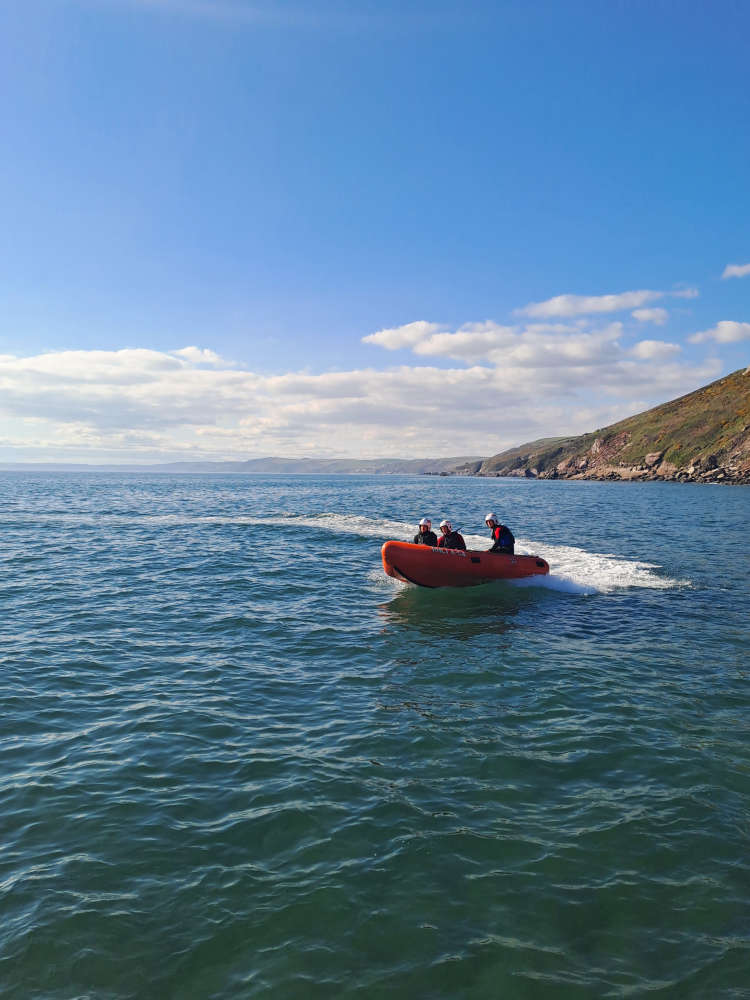
The Easter holidays brought a wave of visitors to Whitsand Bay - but also a surge in incidents for on-duty RNLI lifeguards, as beachgoers found themselves caught out by the incoming tide.
RNLI lifeguards were on patrol at Tregonhawke beach for the Easter holidays, from 5 April to 21 April.
In the first week alone (April 5 – April 12), RNLI lifeguards at Tregonhawke assisted 17 people and carried out nine rescues, all involving people cut off by the tide.
In addition, RNLI lifeguards responded to three minor first aid incidents, one major first aid, and reported several near misses, underlining the unpredictable nature of the coastal environment.
As well as cut offs, Whitsand Bay is known for its strong rip currents, especially during changing tides and larger swells. Visitors are advised to swim only in lifeguarded areas and to stay informed about local sea conditions to ensure their safety.
Tidal cut-offs remain one of the most common and dangerous incidents along the bay’s rugged coastline. Whitsand Bay is particularly prone to rapid tidal changes that can trap unsuspecting walkers and beachgoers.
Seasonal RNLI Lifeguard Supervisor, Beau Gillett, said: ‘It only takes a few minutes for a safe stretch of sand to become completely cut off. People often think they have more time than they do, and once the tide turns, it moves fast.
‘Our teams are back on the beach at Tregonhawke this weekend (26 and 27 April), before returning full time for the summer season from Saturday 3 May.
‘Patrols on Tregantle, Sharrow and Seaton will be full time for the summer season from Saturday 17 May, while our teams will be at Freathy between July 19 and September 7 on weekends and bank holidays.’
RNLI lifeguards are urging the public to take these essential precautions:
- Always check the tide times.
- Plan your route, especially if you're walking along the base of cliffs or exploring coves.
- Allow plenty of time to return to safe ground—don’t assume you can beat the tide back.
- Keep an eye on the sea and look for warning signs of the tide turning.
- If you're unsure, ask lifeguards or locals for advice—they know the area best.
- In an emergency, call 999 and ask for the Coastguard.
With warmer weather and more visitors expected in the coming weeks, lifeguards are reminding everyone to respect the sea, stay alert, and never underestimate the speed at which the tide can change.



 Discover the art behind science with a stunning exhibition by the Eden Project Florilegium Society
Discover the art behind science with a stunning exhibition by the Eden Project Florilegium Society
 Marlborough School Celebrates 60 Years with Exciting Community Events & Outdoor Revamp
Marlborough School Celebrates 60 Years with Exciting Community Events & Outdoor Revamp
 Plymouth Marjon University society making waves in sport inclusivity
Plymouth Marjon University society making waves in sport inclusivity
 GP Surgery Refurbs In Cornwall And The Isles Of Scilly To Enable Over 85,000 More Appointments In The Area
GP Surgery Refurbs In Cornwall And The Isles Of Scilly To Enable Over 85,000 More Appointments In The Area
 Over 60 local artists support museum’s Dementia Programme
Over 60 local artists support museum’s Dementia Programme
 Revamped college drives growth and opportunity
Revamped college drives growth and opportunity
 St Austell MP praises ‘Outstanding’ education and training
St Austell MP praises ‘Outstanding’ education and training
 St Michael’s Mount to Light Up in The Wave Project Blues for Mental Health Awareness Week
St Michael’s Mount to Light Up in The Wave Project Blues for Mental Health Awareness Week



